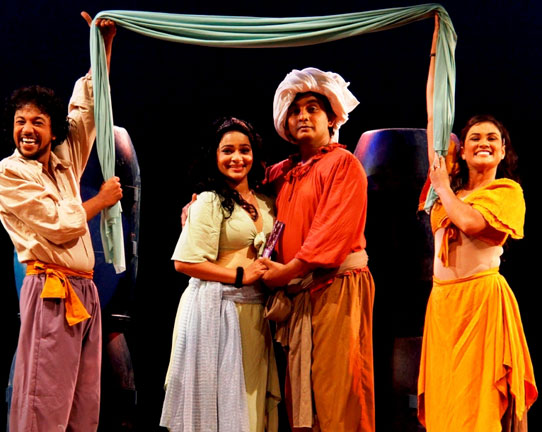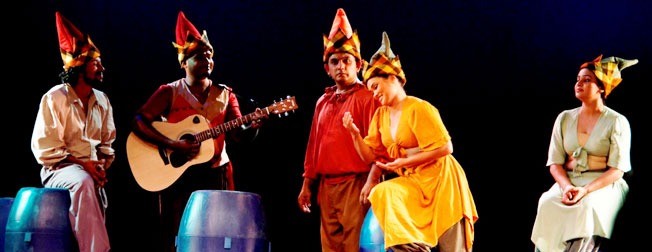|
 A critical response to this year's Best Drama Award: A critical response to this year's Best Drama Award:
Meat to please the palate
by Dilshan Boange
The State Drama Festival this year, saw a dramatic culmination point,
come the awards ceremony which saw a highly disgruntled fraternity of
theatre artistes/practitioners expressing displeasure over the lack of
prominence shown by the authorities in the decision to hold an awards
ceremony of which status was deemed unworthy by theatre artistes.
My article this week is also one of protest relating to this year's
State Drama Festival. The critical response I bring forward is whether
the panel of judges which consisted of (to the best of my knowledge) -
Asoka Handagama (Panel Chair) Manubandu Vidyapathi, Pujitha de Mel,
Pulsara Liyanage, Buddhadasa Galappatti and Jayasumana Dissanayake did
justice in selecting a worthy winner to claim the award for Best Drama?
 The stage play which was awarded Best Drama at the aforesaid festival
was Raja Mang Vahala by Chamika Hathlahawatte. I watched the play being
performed as part of the festival, on March 21 at the Tower Hall, and
reviewed it in the April 3 issue of the Sunday Observer, under the title
- A theatrical critique gone awry. I was told by a source from the
Sinhala theatre that Raja Mang Vahala had been adjudged worthy of awards
for the following - Best Actor, Best Actress, Best Production, Best
Direction, Best Choreography and Best Music Score. It appears, Raja Mang
Vahala has managed to pull off something like a Ben Hur or a Titanic
(both films holding the record for the most number of Academy Awards won
by a movie) at this year's State Drama Festival. The stage play which was awarded Best Drama at the aforesaid festival
was Raja Mang Vahala by Chamika Hathlahawatte. I watched the play being
performed as part of the festival, on March 21 at the Tower Hall, and
reviewed it in the April 3 issue of the Sunday Observer, under the title
- A theatrical critique gone awry. I was told by a source from the
Sinhala theatre that Raja Mang Vahala had been adjudged worthy of awards
for the following - Best Actor, Best Actress, Best Production, Best
Direction, Best Choreography and Best Music Score. It appears, Raja Mang
Vahala has managed to pull off something like a Ben Hur or a Titanic
(both films holding the record for the most number of Academy Awards won
by a movie) at this year's State Drama Festival.
Lamentable decision
Having seen other stage plays that competed for the coveted award of
Best Drama this year I must say, the decision by the panel of judges is
deplorable and utterly lamentable.
Raja Mang Vahala showed comparatively poor theatre craft within the
context of proscenium theatre and seemed more in the vein of a street
drama mounted on the boards to benefit from the technical advantages
that the proscenium offers, from lighting to an elevated performance
platform.
The 'theatrical' creation mounted on the boards by Hathlahawatte
showed a sizable effort with acrobatics and rhythmic movement,
complemented by percussion sound and music, but offers little innovation
in terms of narrative craft for the theatre.
I have no doubt there were many who enjoyed the carousing musicality
and dancing spectacle offered by the ensemble of three actors and two
actresses who performed Raja Mang Vahala. Some factors of showmanship no
doubt succeed in arousing the 'mood for song and dance' and in that
sense it also works as a musical show.
The childish antics performed by actors of screen and theatre fame,
Sanath Wimalasiri and Sarath Karunaratne to (theatrically) 'caricature'
various personae they characterized as part of the 'storytelling', which
included King Dutugemunu, elicited bursts of laughter . It was to show
the play contained in its vein a call to youthfulness. Given its merits,
it also works as a clown show.
Anyone who watched the play and was acquainted with the term 'stage
craft' will see that Raja Mang Vahala shows paltry stage craft compared
to some of the other entries that competed. However, in all fairness to
the play and its creator(s) it must be said, in respect of choreography
Raja Mang Vahala does prove worthy.
Politics and art
As I mentioned before, the play displays an element of 'showmanship'.
Why would a play of this nature be adjudged 'Best Drama' one may ask?
The answer from what I can gauge from its contents is that, it must be
'read' in conjunction with the politics of the day. During the previous
regime, the hyper drive towards glazing just about all spheres of
activity with a Sinhala Buddhist ideological garb to uphold and venerate
the Sinhala Buddhist ethos, saw how any work of art, or activity
program, bearing even a semblance of 'Buddhist piety' and extolling the
Sinhala Buddhist establishment was a qualifier for state patronage and
government recognition.
 It seems under the present government, it seems the order of the day
is to swing towards another extremity. Cheer and reward any activity
that jeers or snidely lampoons the Sinhala Buddhist ethos. Raja Mang
Vahala offers that qualification through its story sketch that seeks to
critique the image of heroism traditionally ascribed to King Dutugemunu,
who is considered more or less the champion of Sri Lanka's Sinhala
Buddhist legacy. It seems under the present government, it seems the order of the day
is to swing towards another extremity. Cheer and reward any activity
that jeers or snidely lampoons the Sinhala Buddhist ethos. Raja Mang
Vahala offers that qualification through its story sketch that seeks to
critique the image of heroism traditionally ascribed to King Dutugemunu,
who is considered more or less the champion of Sri Lanka's Sinhala
Buddhist legacy.
Recalling Rathnavalli
To anyone who is quick to conclude that my contention is purely a
grouse over how Raja Mang Vahala vilifies King Dutugemunu, and brand me
a Sinhala Buddhist chauvinist please take note of the following. Years
ago during my undergrad days, I watched on its opening night at the
Elphinstone Theatre the partly operatic stage play Rathnavalli written
by Dr. Sunil Wijesiriwardena which had the talented musician Nadeeka
Guruge directing its song and music score. Back then I was the male
co-host of the TV show Bonsoir and we even visited Guruge and the cast
at rehearsals at Punchi Theatre's upper floor, to feature a segment
about that play on an episode about theatre.
Rathnavalli proved to be somewhat a controversial play to the
traditionalists back then. It strongly critiques the legacy of King
Dutugemunu within the context of statecraft and political strategy and
is a thunderous attack on the Sinhala Buddhist ethos and notions of
Buddhist piety as perpetuated in society by the State. However one may
choose to view the politics of Rathnavalli, what one cannot deny is that
as a theatrical critique it showed striking incisiveness and depth. As a
stage play it showed impressive 'theatre craft'. A theatre work of that
calibre proves its worth as art.
Hathlahawatte's Raja Mang Vahala on the other hand, offers its attack
on the Sinhala Buddhist ethos as a juvenile outburst. A quick kick in
the pants, a knock on the head, a slap on the cheek and a boisterous
laugh to boot. And it is all placed between two other theatrical
sketches that have no overt relevance to state politics.
The first being a fairytale about a slave who rises to greatness,
even to snub a princess and the last being how a lovelorn teenager
resorts to killing the object of his obsessions. As a theatrical
creation that purports to challenge notions of 'heroism' Raja Mang
Vahala tries to pass off its pitifully devised 'political critique'
suited for the ideological forte of the present establishment, as though
it makes no special overture to win acclaim on the basis of politics
over aesthetic and technical merits of the art of theatre.
The art of the sandwich
When two slices of bread hold edibles between them, that simplest of
culinary creations is called a sandwich. By no means do I demean the art
of sandwich making which has evolved into gastronomic proportions the
world over, by citing the simplicity of its rudimentary form. But what I
like to cite is how the sandwich got its name. It is somewhat debated
but generally accepted through British lore and also supported by
certain biographic accounts and memoirs of writers that the word
sandwich traces its origins to how John Montagu, 4th Earl of Sandwich (a
peerage of the English nobility) liked to have his meat held while he
played cards with his friends. He was believed to have his servants
bring him slices of meat placed between two slices of bread so he could
hold his snack conveniently without getting the meat's grease and juices
on his hands. And his friends had soon taken to the method and begun to
order "the same as Sandwich."
In the light of what has been discussed, Raja Mang Vahala, one may
contend, seems to have nimbly offered the desired 'meat' that pleased
the 'political palate' of the day. |

